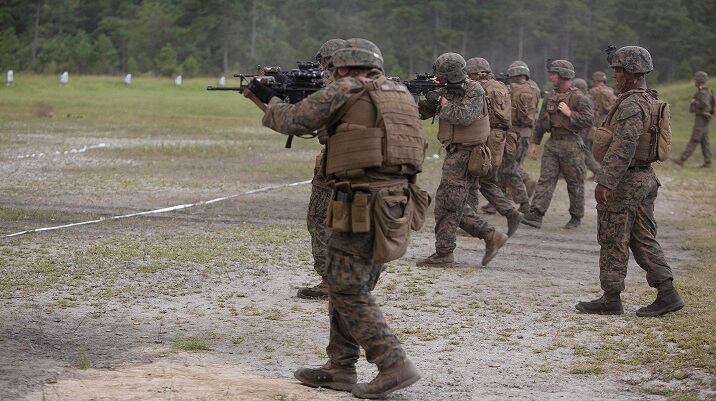The Marine Corps recently selected a Michigan-based company to provide soft armor inserts for its upgraded body armor suite.
The move is one of many being made by both the Marine Corps and the Army to make body armor lighter, more resilient, fit better and provide adjustable levels of protection for Marines and soldiers.
Armor Express announced the contract award, which will include nearly $60 million of orders for as many as 1.3 million Plate Carrier Generation III soft armor inserts and data reports by October 2023. The inserts include 658,142 base vests, 658,142 side plate pockets and 6,370 cummerbunds.
This announcement comes on the heels of a September contract award to Vertical Protective Apparel, LLC, a New Jersey-based company, to produce the actual plate carrier system for the Marines.
That contract is valued at more than $62.6 million and could produce up to 225,886 plate carriers by 2023.
“The legacy carrier fit the span of the Marine Corps, but this new system is more tailorable to fit Marines of various sizes with three new smaller-stature options,” Flora “Mackie” Jordan, body armor engineer for the Infantry Combat Equipment Team at Marine Corps Systems Command, said in a release.
The aim was to provide mobility by reducing the weight and bulk of the vest. The work shaved 25 percent of the weight from the vest system, Jordan said.
That meant cutting off material from the shoulders and 1.5 inches from the bottom of the carrier.
These awards began with notices put to industry a year ago and are part of more customizable gear to fit a variety of body shapes from tall to short, large to small, male to female.
The larger initiative goes beyond the armor and will also look to customize boots and other body-worn gear across the formation, according to a 2016 directorate policy change that aimed to broaden equipment fitting abilities.
As these body armor adjustments are being made over the coming years, the Marines are pushing for further advances in body armor aimed specifically at lower-end conflicts.
In August, officials with Marine Corps Systems Command, which handles basically all things gear for Marines, put out a notice to industry asking for new, lighter body armor with the hopes of providing “protection from non-armor piercing rounds that are currently prevalent in counterinsurgency operations and other low intensity threat environments.”
Right now, the body armor options for Marines are limited, either full kit, heavy weight or nothing.

“The only problem is Marines are currently given a binary choice between taking on 15 pounds to be protected or zero pounds and very little protection,” Nick Pierce, Individual Armor team lead, program manager of Infantry Combat Equipment at Marine Corps Systems Command, said in a release.
“This new lightweight plate would protect Marines and give commanders the choice of what plate to use based on the specific mission,” Pierce said.
That effort is focused entirely on the plate, and officials got to see a variety of options at an industry day at Quantico, Virginia, in late September.
Sixteen companies showcased their wares, all pushing to give Marines an 8.6-pound Enhanced Small Arms Protective Insert. The current version weighs 15 pounds.
The Corps has decided to keep the same basic shape and materials of the ESAPI.
“The materials for plates haven’t had a big tech leap,” Pierce told Marine Corps Times. “A lot of people are trying to find that next leap.”
Officials expect to field the counterinsurgency armor by 2020.
Todd South has written about crime, courts, government and the military for multiple publications since 2004 and was named a 2014 Pulitzer finalist for a co-written project on witness intimidation. Todd is a Marine veteran of the Iraq War.





